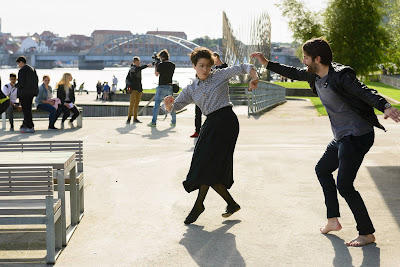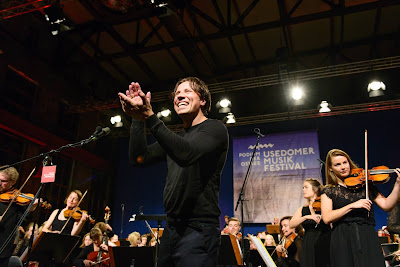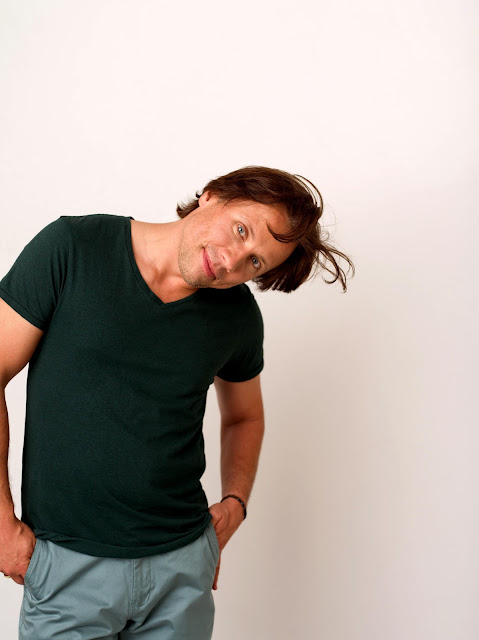 |
| Kristjan Järvi, Gidon Kremer and the Baltic Sea Philharmonic rehearsing in Gdansk photo Baltic Sea Philharmonic / Peter Adamik |
You don't necessarily expect to talk about politics with a conductor who is publicising his latest records, but Kristjan Järvi is not an ordinary sort of conductor. Everything he does is shot through with concern for the problems in society and the need to connect to the natural environment. I recently met up with him to talk about his recent projects with the Baltic Sea Philharmonic, his latest disc with them, and his new disc of music by Steve Reich with the MDR Leipzig Radio Symphony Orchestra. Yet one of the things he came back to in our conversations was his bewilderment at the world right now with the development of a number of dictators in the 21st century.
My conversation with Kristjan never quite took on a regular structure, instead it flowed according to flow of Kristjan's thoughts; metaphors cropped up regularly, regarding his passion for the way of music, nature and society are all linked. By the end of our talk I began to understand the underlying connection between his varied projects. And I have never had someone quote Bruce Lee in an interview before.
Everything is connected
 |
| On tour: Zuz A Ana and Adrien Le Gall from the Baltic Sea Philharmonic Photo: Baltic Sea Philharmonic / Peter Adamik |
This can sound a bit airy-fairy, but Kristjan combines passion with a real practicality when putting ideas into practice. For the rehearsals for the recent tour, he took them to a very rugged wild place on the coast where the wild-life included swans. They thought he was nuts, and calling it the Baltic jungle but for Kristjan it was the best place for the young players to connect with nature; nature which inspired all the music they were performing. The swans were important too, not only as the emblematic bird of the area but because the birds inspired the music in the programme, Arvo Pärt's Swansong, Sibelius's Swan of Tuonela and Tchaikovsky's Swan Lake.
The young players to start thinking differently, and not just concentrating on the notes. Kristjan wanted them to feel the music, be transformed by it. His aim was not for them to create perfection when they performed, but to create a flow where nothing could go wrong because the players become, in some sense, the music. He sees this as a recreation of the natural flow of nature and, of course, a metaphor for society.
Kristjan feels strongly that if you do something, you should do it with a purpose. For him music is more than just notes, it is motivational and capable of unlocking the intuitive core in us all. And a project like the recent Baltic Sea Philharmonic tour fulfils all this. He refers to it as the best tour he has had with the orchestra, and it showed what people can achieve if they act as a united force.
The political borders have changed, yet culture has remained the same
 |
| Kristjan Järvi and the Baltic Sea Philharmonic Photo: Baltic Sea Philharmonic / Peter Adamik |
It is very easy for us in Western Europe to forget how nervous all the political and military manoeuvring makes the smaller Baltic countries. With players drawn from all ten Baltic countries including the powerful neighbour, the orchestra helps to show that all are in the same boat, that Baltic cultures are something to be proud of, that they are one Baltic nation. The Baltic states are remarkably diverse, yet remarkably close to each other; the recent tour took in Lithuania, Russia, Poland, Denmark, and the island of Usedom (split between Germany and Poland) for the Usedom Music Festival. For Kristjan the lands have not changed, it is the political borders which have changed, yet culture has remained the same.
 |
| Kristjan Järvi, Gidon Kreme and the Baltic Sea Philharmonic, at Historical Technical Museum, Peenemünde, for the Usedom Festival |
Kristjan calls Gidon Kremer (born in 1947 and growing up in Soviet controlled Latvia) one of the few violinist's left from an era the does not exist any more, in the concerto he was almost telling his own story. Kristjan also can relate to this narrative, through the eyes of his father Neeme Järvi (born in 1937 and growing up in Soviet controlled Estonia) and the composer Arvo Pärt; people close to him who have lived through a similar reality.
A teleportation device into a different dimension
Kristjan and the Baltic Sea Philharmonic have just released their first disc, on Sony Classical, Wagner: The Ring, an orchestral adventure. An hour long orchestral adventure culled from Wagner's Ring. But the performance links to the group's concerns for the natural world, and Kristjan has tapped into theories which place the legends on which Wagner based the Ring in the Baltic rather than in Iceland where the Eddas were written. Kristjan sees Wagner as an idealist, who wanted to create a world 'his ideal', and he calls The Ring a teleportation device into a different dimension.
An all encompassing, immersive show
 |
| Kristjan Järvi and the Baltic Sea Philharmonic, at the Historical Technical Museum, Peenemünde, for the Usedom Festival |
The music will show different facets of the Baltic region inspired by water, and will include arrangements of Handel's Water Music and Philip Glass's Aguas de Amazonas, a work which does not exist in Glass's regular catalogue. Compiled by Uakti, a Brazilian instrumental group, Aguas de Amazonas uses Glass's music to represent every river tributary of the Amazon. Charles Coleman has done a transcription of the work (with Glass's blessing). Kristjan has already performed it with his other orchestra the MDR Leipzig Radio Symphony Orchestra, and their recording of it is being released on Glass's Orange Mountain Music label to coincide with the Waterworks performances.
 |
| Kristjan Järvi and the Baltic Sea Philharmonic, at Historical Technical Museum, Peenemünde, for the Usedom Festival |
This returns us to Kristjan's concern to create a natural flow in performance. Without having to read the dots, once the players have learned the music, they can breathe it out and the performance becomes an expression of their being. He adds that if you play just the notes then you kind of get there, but not all the way. He talks about the Firebird story and how the opening needs to really evoke the moving ice sheets on the river. He gives me a graphic aural demonstration of the sort of sounds for which he is aiming, and if this is anything to go by we should be in for an amazing performance.
'He maybe just an idealist talking shit'.
I mention the Aurora Orchestra whose performances of classic repertoire from memory have been making a stir in the UK, and he comments that they are great and that he loves them for doing it. He feels that such performances enable us to get to the real essence of what we are elusively missing in regular performances.
For Kristjan, if you get to the real essence, core of performance, then that is so inspiringly empowering that you are not performing it but living it. And he feels the audiences will not only appreciate, but follow and be inspired by the performers. Then, deprecatingly he adds that 'he maybe just an idealist talking shit'. But for him all projects reflect a certain idealism, with Baltic Sea Philharmonic reflecting this the most. This reflects a world that he would like to live in, wants to create and does not see it around him.
Reich's music is entrancing, full of life and meaning, and above all honesty
It is this idealism which links Kristjan to his other current project, the disc Duet recorded with the MDR Leipzig Radio Symphony Orchestra (of which he is the musical director). Music by Steve Reich recorded in celebration of his 80th birthday and the culmination of Reich's three year residency with the orchestra. Kristjan finds Reich an inspiration and his music, like that of Arvo Pärt, has had a transformative effect on Kristjan's life. For Kristjan, Reich's music is entrancing, full of life and meaning, and above all honesty. Kristjan talks about the way Reich, throughout his career, has been constantly ahead of trends, often creating them and how his music is integrated with popular trends and not boxed in. Kristjan calls Reich very uninhibited in his use of material, and finds it very inspiring that an 80 year old is more modern than many 18 year old students.
One of the tracks on the disc is Reich's Clapping performed by Kristjan and Steve Reich. When I check that I had the information right, he grins back at me describing it as cool, adding that he is a very good clapper. In fact Reich was completely hands on for the whole project.
Figures such as Steve Reich and Arvo Pärt are so influential, Kristjan feels, because of general discontent with the status quo, so their music gives people another outlet, adding he feels lucky to work with both composers. with Pärt there is a more logical link through his family (Kristjan's father Neeme premiered Pärt's Credo in 1968), and Kristjan also has a disc of Arvo Pärt's music coming out on Naive.
 As we part, I feel that Kristjan could have gone on all afternoon, seducing us with his passion for the interconnectedness of things. He leaves me with a final thought 'Art changes the world, it creates the reality we aspire to.'
As we part, I feel that Kristjan could have gone on all afternoon, seducing us with his passion for the interconnectedness of things. He leaves me with a final thought 'Art changes the world, it creates the reality we aspire to.'Kristjan Järvi on PlanetHugill.com
Baltic Sea Voyage
Kristjan Järvi and the Baltic Sea Youth Orchestra - CD review
Blaze of Youth
Chad Hoopes, National Youth Orchestra, Kristjan Järvi at the Royal Festival Hall - Concert review
Jazz Inspired
Eddie Gomez, Steven Osborne, Britten Sinfonia, Kristjan Järvi at Saffron Hall - Concert review
Mendelssohn and Adams
Chad Hoopes, MDR Leipzig Radio Symphony Orchestra, Kristjan Järvi - CD review
Recent Recordings
Wagner: The Ring, an orchestral adventure
Kristjan Järvi, Baltic Sea Philharmonic - Sony Classical
Steve Reich - Duet
Kristjan Järvi, MDR Leipzig Radio Symphony Orchestra - Sony Classical
Baltic Sea Voyage
Kristjan Järvi, Baltic Sea Youth Philharmonic - naive
Arvo Pärt - Passacaglia
Kristjan Järvi, Anne Akiko Meyers, MDR Leipzig Radio Symphony Orchestra,
For Kristjan Järvi's future concerts, see the events section of his website.
Elsewhere on this blog:
- Semiramide, la signora regale: Anna Bonitatibus at the Wigmore Hall - concert review
- A Voice from Heaven: The King's Consort's highly recommended new disc - CD review
- Experimental textures: Miles Cooper Seaton and Distractfold at Kammer Klang - concert review
- Characterful & moving: Tavener's late Missa Wellensis - CD review
- Stylish and compact: Ann Murray in Dido and Aeneas - concert review
- The end of time in Clapham: Messiaen's quartet at Omnibus - concert review
- Nyman revisited: Two Tempest themed scores from the 1990s - CD review
- Dystopic Hollywood noir: Mozart's Don Giovanni at ENO - Opera review
- Vibrant young theatre: Opera for All and Garsington Opera in Grimsby with a project on Eugene Onegin
- Mozartian fragment: Classical Opera in Zaide - CD review
- Home


.jpg)









No comments:
Post a Comment